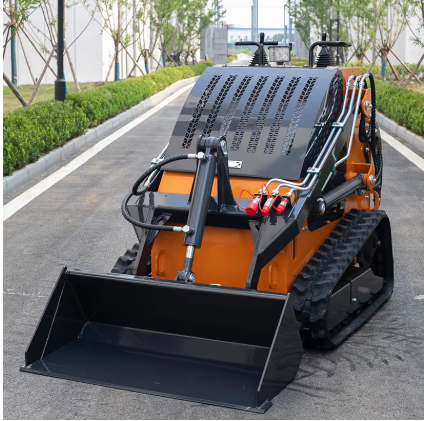The Evolution of Excavators in Infrastructure Development
From Manual Labor to Hydraulic Power
The transition from manual labor to hydraulic power revolutionized the field of excavation. Traditionally, construction relied heavily on manual labor, with workers using basic tools to perform grueling tasks, leading to time-consuming, labor-intensive processes. The advent of hydraulic excavators, however, marked a new era in construction, significantly enhancing efficiency. Hydraulic systems offer unparalleled force and precision, allowing for faster and more accurate work. For instance, hydraulic excavators can accomplish tasks up to three times faster than traditional methods, drastically reducing both time and labor costs. This evolution has been crucial in meeting the increasing demands for infrastructure development, allowing projects to be completed more quickly and safely.
Integration of Compact Machinery (Mini Bulldozers, Crawlers)
Compact excavators, such as mini bulldozers and crawler excavators, have revolutionized urban and small-scale projects. Designed to operate in tight spaces where larger machines cannot reach, they provide unmatched versatility and accessibility. Compared to traditional models, these machines are highly maneuverable and efficient, making them indispensable in urban landscapes. For example, they have been successfully utilized in narrow street renovations and small-scale construction sites, where their ability to work efficiently in confined spaces enhances productivity and safety. Their integration into modern infrastructure projects underscores their importance in fulfilling urban development needs.
Global Market Growth and Key Players
The global excavator market is experiencing significant growth, driven by technological advancements and rising demand in the construction and mining sectors. According to industry reports, major players such as Caterpillar, Komatsu, Hitachi Construction Machinery, and Volvo Construction Equipment are at the forefront, pioneering innovations and expanding their international production capabilities. These companies' contributions to technological advancements have positioned them as leaders in the market. The increasing reliance on excavators in developing regions reflects the rapid expansion of infrastructure development, highlighting the vital role excavators play in shaping modern infrastructure landscapes. These market trends also indicate promising opportunities for investment and development in this dynamic field.
Key Applications in Modern Infrastructure Projects
Land Clearing and Site Preparation
Excavators are pivotal to efficient land clearing and site preparation for varying infrastructure projects. Their ability to swiftly clear sites and prepare groundworks is enhanced by advances in technology, which improve operational capabilities, safety, and speed. Excavators equipped with modern functionalities have revolutionized these processes, reducing the need for manual labor and minimizing errors. For example, projects such as large-scale commercial developments and residential complex constructions often involve extensive land clearing. These projects demonstrate how strategic use of excavators leads to success, ensuring timely and precise site readiness.
Excavation and Grading for Roads and Foundations
Advanced excavators play a crucial role in precision excavation and grading, particularly for roads and building foundations. The importance of accurate grading cannot be overstated, as it ensures the structural integrity and safety of the final construction. Modern excavators are equipped with technologies that provide detailed grading capabilities, resulting in optimally leveled surfaces. According to industry data, employing excavators for these tasks has proven to offer substantial time and cost savings—often up to 30% reduced expenses compared to traditional methods. This efficiency highlights why excavators are preferred in road and foundation projects.
Demolition and Urban Renewal Initiatives
Excavators are essential tools in urban demolition and renewal efforts, contributing significantly to reimagining city landscapes. Their ability to efficiently dismantle old structures while ensuring minimal environmental impact is crucial for sustainable renewal projects. During urban demolitions, it's important to consider pollution and recycling, making excavators equipped with eco-friendly technologies favorable. Cities such as Detroit have implemented urban renewal projects using innovative excavator technologies to reinvigorate spaces and convert derelict areas into vibrant community hubs. These projects exemplify the positive impact excavators have on urban redevelopment.
Material Handling in Large-Scale Construction
In large-scale construction projects, excavators facilitate efficient material handling, integral to streamlined operations. Their ability to quickly move materials and work alongside other machinery optimizes productivity, ensuring projects move smoothly. Excavators coordinate with machines such as bulldozers and cranes, creating an efficient workflow that bolsters project timelines. Projects like skyscraper constructions need thorough material handling strategies, and excavators have proven exceptionally capable. Case studies from past projects reveal how effectively integrating excavators increases efficiency and reduces delays, making them indispensable in large-scale settings.
Environmental Restoration and Sustainable Practices
Excavators are fundamental in environmental restoration projects and promoting sustainable construction practices. They assist in reshaping landscapes, restoring habitats, and implementing eco-friendly construction techniques. Specifically, excavators equipped with modern technologies can perform tasks like soil regeneration and waterway reconstruction with greater precision. Statistics demonstrate their effectiveness, showing improved restoration rates and habitat recovery times. By using advanced excavators, projects are able to balance construction needs with environmental responsibility, illustrating the growing importance of sustainable practices in today's infrastructure development.
Technological Innovations Driving Efficiency
IoT and Remote Monitoring for Predictive Maintenance
IoT technology has revolutionized excavator maintenance and efficiency management by facilitating real-time monitoring and predictive maintenance strategies. Through IoT-enabled devices, operators can track the health of excavators, receive alerts for potential issues, and schedule timely maintenance, thereby reducing unexpected downtime and repair costs. The incorporation of IoT enhances operational efficiency significantly by preemptively addressing maintenance needs. Companies like Caterpillar have adopted IoT technology, enabling them to achieve improved equipment uptime and cost savings.
Hybrid and Electric Power Systems
The rise of hybrid and electric excavators marks a significant shift toward more sustainable construction practices. These systems promise substantial benefits over traditional diesel-powered models, including reduced emissions and lower operational costs. Hybrid and electric excavators are not only environmentally friendly but also offer cost savings due to their reduced fuel consumption and maintenance needs. In future trends, there's a growing expectation that the adoption of sustainable power systems will continue to rise, driven by increasing emphasis on environmental responsibility in infrastructure development.
GPS-Guided Automation for Precision Tasks
The integration of GPS technology has greatly enhanced the precision and accuracy of excavating tasks. GPS-guided excavators operate within tight project specifications, ensuring that grading and excavation tasks are executed with unmatched accuracy. These systems guide the excavator's movements based on pre-programmed coordinates, significantly reducing errors and enhancing productivity. Projects utilizing GPS-guided excavation equipment have demonstrated improved outcomes, with examples showing faster completion times and reduced material waste, effectively optimizing workflow efficiency.
Sustainability and Environmental Impact
Reducing Carbon Footprint with Energy-Efficient Designs
Excavators have evolved significantly in terms of energy efficiency, directly addressing the industry's need to reduce carbon footprint. Recent excavator designs incorporate advanced technologies that lower fuel consumption, leading to a considerable decrease in emissions. According to industry reports, some modern models exhibit up to a 20% reduction in fuel usage compared to their traditional counterparts. By comparing these new models with older, less efficient machines, it becomes evident that energy-efficient excavators offer not only environmental benefits but also operational savings for businesses through reduced fuel costs and lower maintenance demands.
Compliance with Global Emission Standards
In response to escalating environmental concerns, global emission standards have become stringent, impacting the excavator industry profoundly. Leading manufacturers are now actively developing models that comply with these rigorous standards, aligning with initiatives like the European Union's Stage V and the United States' EPA Tier 4 regulations. Companies adhering to these emissions guidelines enhance their market competitiveness by appealing to environmentally conscious consumers and reducing their ecological impact. For instance, case studies reveal that compliance not only fosters a healthier environment but also empowers manufacturers to capture a growing market segment that prioritizes sustainable practices.
Role in Green Infrastructure Development
Excavators play a pivotal role in promoting green infrastructure projects, reflecting the industry's commitment to sustainability and environmental stewardship. These versatile machines are increasingly integral to projects focusing on sustainable urban development and renewable energy setups like wind and solar farms. An example is their use in the construction of eco-friendly stormwater systems and the restoration of natural habitats, where excavators help create landscapes that support biodiversity. As sustainable development efforts intensify, the role of excavators is poised to expand, underscoring their significance in fostering green initiatives and infrastructural resilience.
Global Market Dynamics and Future Outlook
Dominance of Major Brands (Caterpillar, Komatsu, SANY)
Major brands like Caterpillar, Komatsu, and SANY dominate the global excavator market, and their enduring market share reflects their strategic prowess and commitment to innovation. These leading brands sustain their competitive edge by investing heavily in research and development and creating cutting-edge excavator models. According to recent market reports, Caterpillar and Komatsu alone account for a significant portion of the market, thanks to their comprehensive international operations and robust product offerings. By continually advancing their technological capabilities, these brands influence trends in the excavation industry, pushing boundaries in machine durability and operational efficiency.
Growth in Emerging Economies (Case Study: Mexico)
Emerging economies, such as Mexico, exhibit substantial growth in the excavator market, driven by heightened infrastructure investment. This growth trend is deeply intertwined with the increasing demand for modern construction equipment in regions experiencing rapid development. According to industry data, infrastructure projects in Mexico have led to a notable surge in excavator sales and rentals, with global manufacturers seeking to capitalize on this opportunity. The effects of this growth extend beyond local markets, impacting global suppliers and manufacturers who are adjusting their strategies to cater to Mexico's expanding needs.
Forecasted Trends in Smart and Autonomous Excavators
The excavator market is on the cusp of a groundbreaking shift with the advent of smart and autonomous excavators. Industry forecasts suggest a significant transition towards these technologically advanced machines, which offer unparalleled efficiency and operational capabilities. The development of smart excavators, equipped with cutting-edge sensors and automated controls, promises to transform construction operations, improving safety and reducing the need for manual labor. Experts predict that autonomous excavators will play a crucial role in future infrastructure projects, offering precise and adaptable solutions for complex construction challenges. This anticipated evolution underscores the industry's focus on innovation, setting the stage for a new era in excavation technology.
FAQ Section
What are the benefits of hydraulic excavators over traditional methods?
Hydraulic excavators offer enhanced efficiency and precision compared to traditional methods, allowing for faster and more accurate work. They significantly reduce both time and labor costs.
How do compact excavators contribute to urban infrastructure projects?
Compact excavators are designed for operating in tight spaces, making them ideal for urban landscapes. They provide versatility and efficiency in projects like street renovations and small-scale constructions.
What are the new technological trends in the excavator market?
The market is seeing a shift towards IoT, hybrid and electric systems, GPS-guided automation, and smart autonomous excavators, enhancing operational efficiency and sustainability.
How are excavators impacting environmental restoration efforts?
Excavators are crucial in reshaping landscapes, restoring habitats, and implementing eco-friendly construction techniques, balancing construction needs with environmental responsibility.
Which brands are leading the global excavator market?
Major brands like Caterpillar, Komatsu, and SANY dominate the market, investing in research and development to create innovative excavator models that set industry trends.
Table of Contents
- The Evolution of Excavators in Infrastructure Development
- Key Applications in Modern Infrastructure Projects
- Technological Innovations Driving Efficiency
- Sustainability and Environmental Impact
- Global Market Dynamics and Future Outlook
-
FAQ Section
- What are the benefits of hydraulic excavators over traditional methods?
- How do compact excavators contribute to urban infrastructure projects?
- What are the new technological trends in the excavator market?
- How are excavators impacting environmental restoration efforts?
- Which brands are leading the global excavator market?

